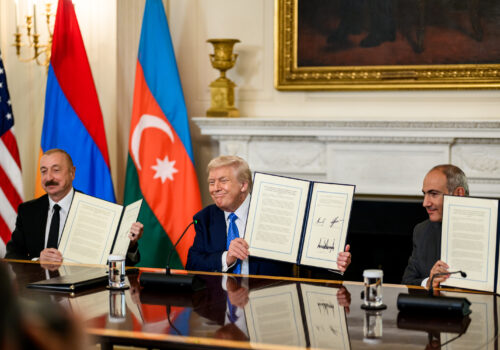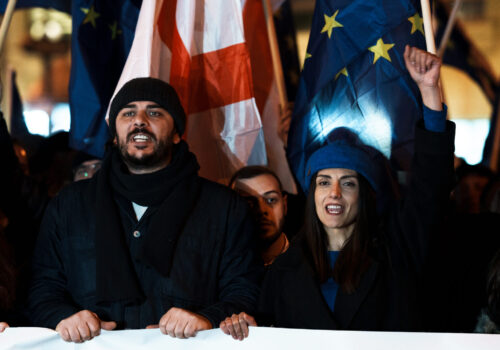Georgia’s summer of repression puts US relations in doubt
The Georgian Dream party has held power in Georgia since 2012 in large part by employing an array of authoritarian tactics, but the first seven months of 2025 may be its most repressive period yet. Led by pro-Kremlin billionaire Bidzina Ivanishvili, Georgian Dream has tightened control in recent months, arresting political opponents and outlawing independent media, all while turning the country away from the United States and the European Union (EU) and toward Russia and China.
Georgian Dream declared itself the victor in last October’s parliamentary elections, despite significant evidence of voter fraud. In the weeks following the elections, thousands of Georgians took to the streets in Tbilisi and around the country in peaceful protests, braving water cannons, tear gas, and police beatings to demand new elections. The protests were given further impetus in November when party leadership announced that it would pause the country’s EU accession efforts until 2028.
Protests and democratic activism continued into spring of this year, but the crowds thinned out and their intensity waned. Georgian Dream took advantage of this superficial calm to push its most repressive initiatives forward. In June, the government’s expanded definition of a “foreign agent” went into effect, to include any individual or entity engaged in media or politics that receives money from abroad. The legislation also introduced steep criminal penalties for those charged under the law.
Georgia’s foreign agent law is based on a similar law in Russia and aims to achieve the same goal: suppress freedom of thought and expression to maintain political power. But it took Russia seven years to implement the same harsh penalties that Georgian Dream has instituted just one year after its initial foreign agent law was passed.
For the sake of Georgia’s security and prosperity, Georgian Dream needs to rethink its domestic repression and its approach to the West.
Georgia’s ruling party continued to crack down on political opposition throughout the month of June. On June 23, Georgian Dream’s media censorship intensified when parliament passed two new bills targeting freedom of speech and expression, and a third banning media coverage of court trials. These new bills make it more difficult for media to cover Georgian politics, and they threaten to turn the legislative branch into a rubber-stamping body for Ivanishvili’s personal initiatives.
Just days later, the Georgian Dream government sentenced leaders of opposition parties to up to eight months in jail for refusing to testify in a parliamentary investigation into the previous government’s “alleged crimes.” These included jail terms for political opponents from different Georgian political parties on questionable charges: Nika Melia, Givi Targamadze, Giorgi Vashadze, and Zurab Japaridze. The opposition figures say the investigation itself is politically motivated. Having manipulated last fall’s election results, it appears Georgian Dream now seeks to remove its opponents from the political scene altogether.
As if to confirm the government’s pivot away from the West, in early June, the government announced that it was closing Tbilisi’s EU and NATO Information Centre, which had helped Georgian citizens better understand integration efforts with Euro-Atlantic institutions.
Georgian Dream officials have also taken the unusual approach of antagonizing the Trump administration, nominally in the hopes of improving relations with the United States. Outgoing US Ambassador to Georgia Robin Dunnigan laid out this puzzling dynamic in a July 3 interview, in which she revealed that Ivanishvili refused to meet with her. She detailed how the Georgian Dream government sent a “threatening, insulting” letter to President Donald Trump’s foreign policy team in a bizarre bid to get sanctions on Ivanishvili lifted. So blithely putting Georgia’s relations with one of the world’s great powers in jeopardy suggests Georgian Dream is not in fact acting in the interest of its people, but rather in that of Ivanishvili himself.
Clearly Georgian Dream’s actions are isolating it from the West, making better relations with the United States unlikely in the short term. Instead, it is embracing like-minded anti-Western partners. Georgia has not only mimicked Russian policies but is also strengthening economic ties with China, the United States’ top strategic competitor. Just this spring, the Georgian government signed an agreement with China to establish a deep-water port in Anaklia on the Black Sea. This project began as the “Anaklia Development Consortium” with joint US-Georgian buy-in, but the government canceled the contract in 2021 and this spring handed the development rights to a US-sanctioned Chinese company, sparking censure in the US Congress.
When Trump returned for his second term, Georgian Dream was optimistic that it could use conservative culture war issues to build a rapport with the US president, and that his administration would look past the party’s domestic repression. When this was proved wrong, the party doubled down on its pivot to China and Russia.
But mortgaging Georgia’s future to the whims of Russian military might and predatory Chinese loans holds risks for Georgian Dream’s grip on power. By pushing away Washington and Brussels, the government will have few places to turn if Moscow decides to move tanks beyond the twenty percent of Georgia it already occupies, or if the high economic and social costs of financing from Beijing begin to weigh down the economy.
For the sake of Georgia’s security and prosperity, Georgian Dream needs to rethink its domestic repression and its approach to the West. This can be done by releasing political prisoners, easing pressure on political opposition, ending the censorship and persecution of independent media, reopening EU and NATO dialogues, and demonstrating a willingness to work constructively with the United States.
Like the majority of the Georgian people, the United States and Europe do not wish to see Georgia coerced by Russian military might or led into a Chinese debt trap. But that is the future Georgian Dream is driving toward if it does not reverse course. The West can once again be a real partner for Georgia against predations from Moscow and Beijing, but only if Tbilisi takes steps soon to restore freedom of speech and political pluralism to the country.
Jessica De Mesa is an assistant director at the Atlantic Council’s Office of Finance and Operations.
Andrew D’Anieri is an associate director at the Atlantic Council’s Eurasia Center. Find him on X at @andrew_danieri.
Further reading
Wed, Aug 13, 2025
Trump’s Armenia-Azerbaijan agreement advanced peace, but Washington can’t let up now
New Atlanticist By
The US-brokered agreement between Armenia and Azerbaijan was an important step. But to achieve a lasting peace, the Trump administration must remain actively engaged as negotiations continue.
Thu, Jun 19, 2025
Addressing Georgia’s slide away from European integration
UkraineAlert By
Officials in Brussels and Tbilisi must act to rebuild trust and address the deteriorating relationship between Georgia and the European Union, writes Matteo Mecacci.
Tue, Feb 18, 2025
Georgia’s pro-Kremlin authorities intensify crackdown on opposition
UkraineAlert By Mercedes Sapuppo
Georgia's pro-Kremlin authorities presented new legislation in February that critics say will increase pressure on the country’s civil society and independent media while also placing additional restrictions on protests, writes Mercedes Sapuppo.
Image: On May 7, 2025, in Rustaveli, members from public broadcasting join the protest. The names of the members of the Political Council of the Renewed ''Georgian Dream'' are read out at the rally and are booed with cries of disapproval. (Photo by Sebastien Canaud) via REUTERS


